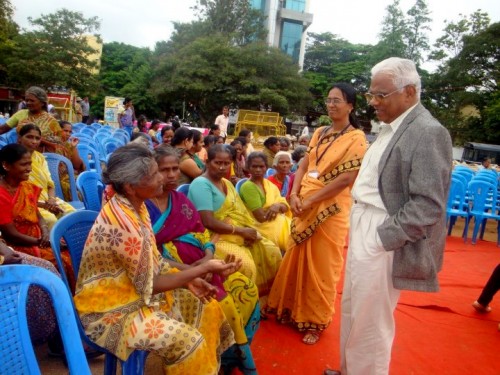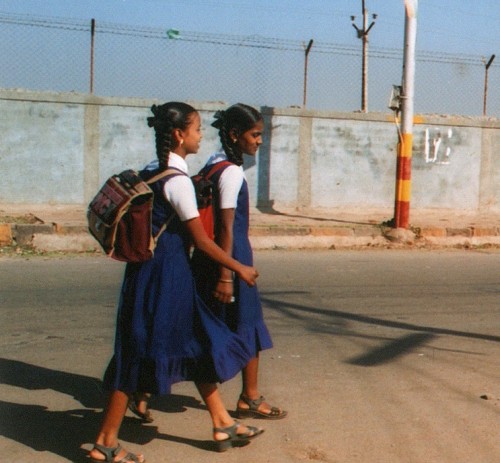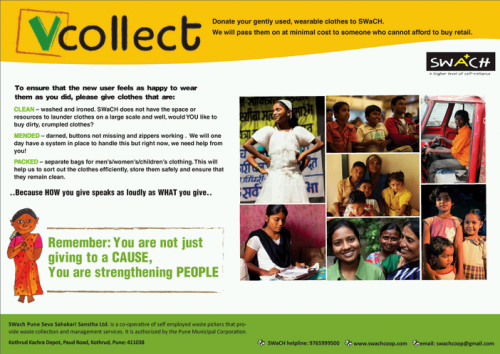August 22, 2012
Index of contents:
- Pension campaign grows stronger
- ‘We reject this future!’: Rio+ 20
- RTE – the door opens slowly
- V-Collect Clothes
- News from Delhi
Pension campaign grows stronger
Secretariat Karnataka State Pension Parishad
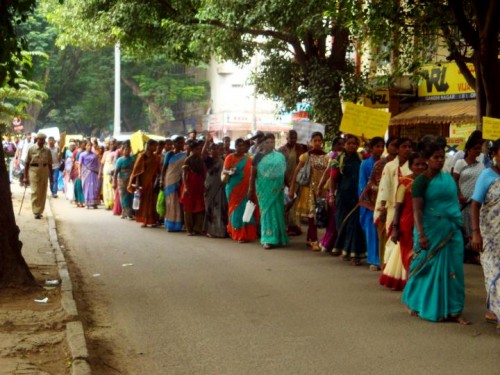
Over 4,000 people, including elderly citizens from all over Karnataka, gathered for a ‘People’s Campaign’ at Freedom Park in Bangalore on 9th August. Organized by the Karnataka State Pension Parishad (a coalition of progressive groups, civil society, and organizations of backward and marginalized communities) with the support of the waste pickers’ organisation Hasirudala, the event began with around 300 leaders representing 22 districts, taking part in a rally from Banappa Park to Freedom Park. The rally was flagged off by veteran labour leader Baba Adhav. The participants at the People’s Campaign included the elderly, dalits, tribals, marginal farmers, domestic workers, single women, waste pickers, construction workers, the disabled, sex workers, transgenders and people living with HIV.
‘Most of them voiced extreme despair and felt excluded from all entitlements and services even as they were struggling to hold their lives together,’ said Sujatha of Sex Workers Union.
Eminent and senior citizens from different political parties, legal luminaries, academicians, social reformers and activists addressed the huge gathering. Aruna Roy, the well known social activist pointed out that with the General Elections fast approaching, no political party could afford to ignore senior citizens who are conscientious voters.MLAs and politicians from across party lines supported the demand and pledged their support.
Well-known personality Girish Karnad made an important point when he stressed that providing pensions to elderly employees was not just the government’s onus – ‘It should be provided by everyone who employs people.’
Now rapidly gathering steam, the Pension Parishad movement started in Pune in March 2012, when marginalized groups came together demanding universalisation of Pension. Within three months, around 5,000 people including a huge number of old citizens, gathered in Delhi at Jantar Mantar for the same purpose.
In Karnataka, efforts are now on to consolidate efforts by submitting memorandums throughout the state.
The demands of the campaign and other details are available here.
‘We reject this future!’: Rio+ 20
Jyoti Mhapsekar
Sushila Sable, Kalpana Andhare and Jyoti Mhapsekar represented the Alliance of Indian Waste Pickers (AIW) at Rio + 20, the Earth Conference, in June 2012 at Rio De Janeiro in Brazil. This conference focused on people’s perspectives on environment protection, in the context of economic prosperity and inclusion/exclusion of marginalized people.
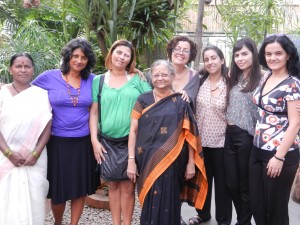
Sushila and Jyoti with a team of women who were interviewed on radio (Courtesy: basuracerojusticiasocial.org)
Learning about each other
The AIW delegates discussed issues with the waste pickers from Latin American countries like Nicaragua, Uruguay, Chile and Columbia as well as with the delegates from Indonesia, and representatives of organizations like GAIA and VIEGO. They gained some interesting insights – for example, that in Latin America, though most cooperatives collect dry waste on a large scale, almost no effort is made to process wet garbage! There were also some issues that were familiar to all – such as large companies grabbing the contracts for collecting waste and driving waste pickers out of business. The AIW team drew encouragement from the successes of some of these waste picker cooperatives who are fighting for their rights in court — one such cooperative in Colombia has even won their case. While in Brazil, after a decade of lobbying, the government has passed a law which officially includes the waste pickers in the solid waste management system.
People’s Summit
From 13th -17th June, over 45,000 people from all over the world participated in the People’s Summit held in tents on the sea front. A separate tent hosted the waste pickers’ organizations, where seminars on the problems faced by the waste pickers were held. Sushila Sable’s talk on AIW’s work received such an enthusiastic response that a separate two-hour session was subsequently held to explain how the waste pickers in Pune were integrated.
Delegates were also very keen to know more from AIW about turning wet garbage into compost/fertilizer. The short film, Nisargajuna, created by the Stree Mukti Sanghatana (SMS), was well received by everyone, particularly since Julia did a ‘live’ translation into Portuguese! The other delegates realized that wet garbage is a resource which when processed, can create green employment, and enthusiastically demanded a Portugese version of the film! The AIW team also sang a song on waste and again, thanks to Julia, it received an equally enthusiastic response.
On 17th June, GAIA and SMS conducted a discussion on ‘Zero Garbage – a fight for sustainable development’ at the various seminars organized by the UN at the Rio Centre. Representatives from San Francisco, Brazil, India and GAIA explained to the delegates that ‘Zero Garbage’ did not mean simply burning the dry waste, and presented the efforts done in as many as 15 different places in the world to process dry as well as wet garbage, to ensure that only the most non-recyclable waste reached the dumping grounds.
On the streets
On the last day of the conference, almost 50,000 people took to the streets with the slogan ‘We reject this future’ — a slogan adopted in opposition to the official United Nations (UN)slogan ‘The future we want’. The demonstrators wanted to make the point that the UN had betrayed the people of the world, making little effort to build on the achievements of the 1992 conference by adopting the numerous innovative suggestions put forth to combat environmental degradation.
back to top
RTE – the door opens slowly
Draupadi Sukale, a widowed mother of two, has been a member of KKPKP for two decades now. A waste picker by profession, Draupadi knows that education is the best way to ensure that her children do well in life — but given the high fees, it was impossible to even think of admitting them to a good school. Now, thanks to the recent Right to Education Act (RTE)which guarantees free and compulsory education, she feels more hopeful about the future — both her children have been admitted to a good school, and she doesn’t have to worry about the fees.
Under the RTE, 25% seats have been reserved in schools for children of lower income group parents.
To ensure that this provision was availed of, SWaCH and KKPKP approached over 40 private schools in the vicinity of slums where a majority of waste pickers live, seeking admission for about 50 children. But even though the Act was passed and the Government Resolution issued, the doors to schools refused to open wide for the children of lower income group parents.
Highlights of Section 12 of the Right of Children to Free and Compulsory Education Act 2009:
- Compulsory for every private unaided school to admit at least 25% of its entry level class from children belonging to weaker and disadvantaged groups.
- For this category of students, the state government shall reimburse schools an amount equal to either the fees charged by the school or the per child expenditure in state schools, whichever is lower.
A Supreme Court of India verdict dated 13 April 2012, upheld the validity of the Section 12. The bench said that 25 percent reservation for students from weaker sections of society would apply uniformly to all government and unaided private schools except unaided private minority schools and boarding schools.
Admission experiences
While KKPKP’s experience was not a completely negative experience, there was a fair amount of ignorance and confusion on the issue, even as June approached and the new academic year was to begin. The schools would say ‘Yes’ in principle, but didn’t issue any admission forms. They were concerned about who would bear the costs of the uniforms, books and other non-tuition fees/funds. Activists found both the Department of Education and most of the principals supportive when they met them, but then, bureaucratic delays and administrative issues would creep in.
Activists and karyakartas then decided to carry photocopies of official letters and the State Government GR whenever they visited schools. If the schools still refused, they managed to seat children in classrooms without formal admission, on the basis of these documents. But the children were made to sit separately!
It was only after these experiences and issues were documented and presented to the Shikshan Mandal (Education Department) that some action finally resulted. A training programme was organised for school managements and they were offered support to clarify their doubts and implement the Government order smoothly.
Parallel to this process, parents too, had to be convinced that it was worth the trouble to seek admission for their children into better schools under the RTE provision. Youth Melas, lively information-sharing events, were conducted in most of the slums, telling young parents that education was now free and compulsory. Parents were helped to gather and submit the necessary documents. Often, this meant repeated and tedious visits to the school offices.
But the hard work had its own reward — by the end of June, many children had confirmed seats in schools within a kilometre from their residence.
Highlights of Pune RTE experience | |
Entry level for students in schools under the RTE Act | KG or Class I |
Total number of seats available in Pune under 25% quota: | 7361 |
Total number of seats filled by June 22 deadline | 2998 (40%) |
Total number of applications made by KKPKP | 53 (1 in process) |
Total number of admissions confirmed | 39 |
Total number of rejections (Reasons given: under/over age. In most case, reasons for rejecting not clear) | 13 |
Total number of applications made by SWaCH | 7 |
Total number of admissions confirmed | 2 |
Number of children attending school, but without official admission | 5 |
Ready for the next round
With the implementation of the Right of Children to Free and Compulsory Education Act or Right to Education Act (RTE) on April 1, 2010, India became one of 135 countries to make education a fundamental right of every child.
This year, many schools cited the fact that their admission procedure was completed many months before the administration made its decision to implement the 25% quota.
But activists are not disheartened. Now that the wheels have been put into motion, they say they will be prepared and ready with all the paperwork well in time for the next academic session.
V-Collect Clothes
For SWaCH, ‘dignity’ is not an empty catch-word – we strive to ensure that our members work and live as far as possible, as equal members of society, and we work hard to change citizens’ attitudes towards us. We want them to recognise our struggle to live, but also our need for respect. When inflation and rising prices strike where it hurts most — in our access to basic amenities like food, shelter and clothing — we look for creative and practical responses to the situation. V-Collect Clothes, is one such effort that helps to give the urban poor access to good, wearable clothes at a time when buying in retail stores is becoming more and more unaffordable.
Underlining the initiative is the tag line ‘How you give matters as much as what you give’ – an important point to be kept in mind in India where too often, donating clothes involves dumping bundles of crumpled, old, torn, even dirty clothes and thoroughly humiliating the person in need.
The posters for the V-Collect Clothes campaign also underlined the idea of ‘recycling’ rather than ‘giving’ and requested clothes that were clean, ironed and wearable – the sort of clothes that would bring as much pleasure to the second owner as they did to the first.
The first V-Collect Clothes was held in June 2012, in partnership with Banjaras, a natural Indian fabrics store, and it garnered strong support from Pune’s citizens. Clothes were generously donated – over 1000 kgs in one week! These were then sorted by SWaCH members according to size, age group, gender and wearability, and a basic price was fixed for each item. They were then made available to anyone who wished to buy.
The response of those who came to buy was also very positive. Sarita Gaikwad of Indira Vasti said that she used to feel so sorry every time she caught her kids staring longingly at shop windows or at better dressed kids. Yet, she could never get herself to spend on clothes, prioritising nutrition and education instead. V-Collect Clothes gave her an opportunity for some guilt free shopping, picking up clothes not only for her boys, but for her sister’s new born as well. ‘We never normally buy clothes for infants,’ she says, ‘but these were so attractive, and so reasonably priced, that I made an exception!’
SWaCH views this initiative as an on-going one, and has been negotiating with the Pune Municipal Corporation for a dedicated space for this venture. PMC has responded positively. The initiative also has the possibility of providing employment and income-generating opportunities to older waste pickers who can no longer ‘make the rounds’, or to younger family members who are educated and capable of handling the business end of the venture.
Providing good clothes at affordable prices to the urban poor is one aim of V-Collect Clothes. The larger aim is to sensitise citizens to the need for some limits to consumerism in order to protect our future. SWaCH members feel that it is important to counter the use-and-throw mentality that has taken hold in the cities by getting citizens to think about those who work almost invisibly in keeping communities clean, about the life-cycle of the products we use, about our choices as consumers and our relationship to the waste we produce.
SWaCH has found several new partners in this venture – Rotary Club, LIC, various housing societies and Orchid School have offered to hold regular V-Collect Clothes events.
Eventually, through efforts such as these, SWaCH would like to see the idea of recycling clothes becoming more of a mainstream idea, not only limited to the urban poor – and one more way of reducing the thoughtless dumping of usable and valuable resources on unsustainable landfills.
back to top
NEWS FROM DELHI
A milestone in the e-waste sector
Chintan has now entered into the new arena of e-waste recycling. E-waste is a commonly used term for electronic and electrical waste. Last year, India formulated the E-Waste (Management and Handling) Rules 2011 which mandated authorization for all kinds of work associated with e-waste. The Delhi Pollution Control Committee has granted Chintan authorization for collecting e-waste — the first and only NGO to receive the e-waste collection authorization in Delhi, a city that has been very wary about the informal sector handling toxic wastes. In all other cases, authorization has been granted to private companies only. Since it was part of the policy-making process, Chintan ensured that no barriers were created for the informal sector which plays a significant role in the recycling of e-waste through itinerant waste pickers and e-waste handlers. Though currently they are collecting e-waste informally, Chintan aims to provide at least 100 green jobs in the first year, so that they can work as per the E-waste (Management and Handling) Rules 2011.
503 waste pickers receive U-ID cards
The Indian government has taken an initiative to provide identification to all Indians, through U-ID cards. Safai Sena is helping its members to get these U-IDs since the lack of formal documents leads to waste pickers and kabaris being routinely harassed.
Firstly, Safai Sena waste pickers were made aware about the U-ID smart card through meetings. Several workshops were held with leaders on how to fill up the U-ID smart card form. Then we started filling up the forms of waste pickers in our working area. A total of 503 U-ID cards were registered for Safai Sena members from Bhopura, Khajuri, Bhopura Taikhand, and Tuglakabad Pusta. The members are thrilled to receive identity proof, some for the first time in their lives.
Tweet


